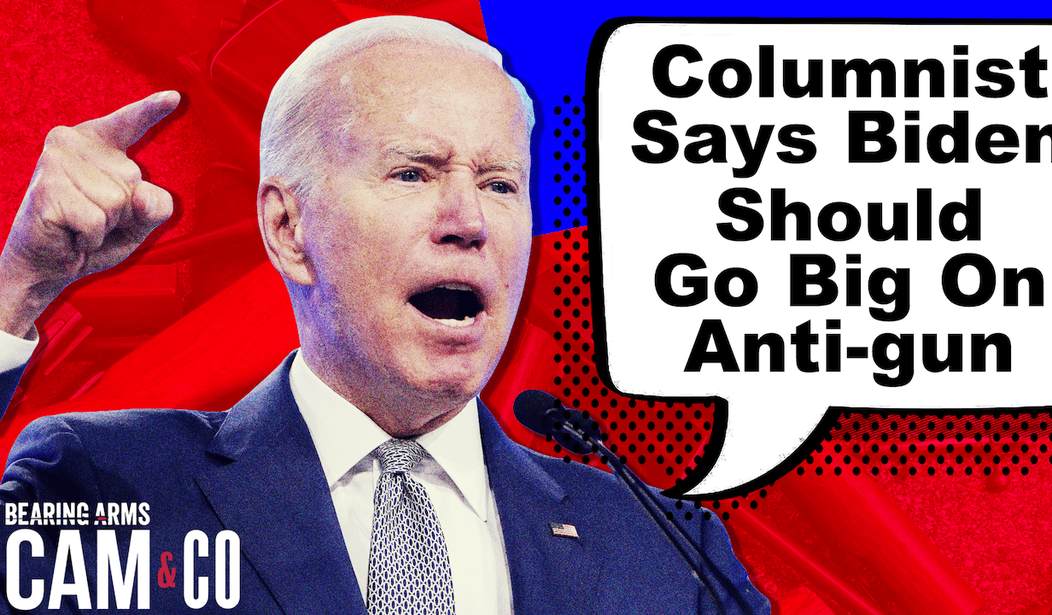Every so often, I’ll start writing a post here at Bearing Arms, get a few paragraphs in, and realize I’ve either come up with a dumb idea that isn’t worth pursuing or end up talking myself out of my original position. Generally, those posts get discarded, though I’m sure that a few dumb thoughts have managed to get published during the three years I’ve worked here (and maybe more than a few, depending on your point of view).
I say that because I have the distinct impression that Bloomberg columnist Timothy O’Brien realized about halfway through his piece on how Joe Biden can “stop gun violence” with one simple executive order that what he was arguing didn’t make sense, but was running up against a deadline and had to plow full speed ahead with his really bad idea. At least I hope for his sake that’s the case. Otherwise, I’m embarrassed for O’Brien for seriously suggesting this and believing it will do what he thinks.
Sales of military-grade firearms need to be curtailed as soon as possible — and without waiting on Congress. President Joe Biden should issue an executive order preventing the departments of Defense, Justice, Homeland Security and Treasury — any federal agency — from awarding contracts to small-arms manufacturers that sell comparable weapons to average citizens. Gunmakers would be forced to choose with whom they do business: soldiers or citizens.
There are so many issues here I hardly know where to begin, but let’s start with the phrase “comparable weapons.” Clearly O’Brien believes that should include semi-automatic rifles, and presumably the sidearms used by military and federal law enforcement as well. That would mean an end to consumer sales of commonly-owned handguns as well as all AR-style rifles. As O’Brien says, that would make gunmakers have to choose between their government and civilian sales… which is exactly where I think O’Brien started to realize maybe his idea isn’t all that he originally thought it was.
How potent would an executive order like this be? It would depend on how much it would hurt the bottom line of companies that sell to the government. Many of the companies are privately held, so their annual revenue and earnings aren’t freely available. Sales at Smith & Wesson, which is publicly traded, doubled to more than $1 billion last year. The company estimates that about 94% of its revenue came from consumer sales last year; the federal government and law enforcement made up only 6% of its sales.
So why would any company give up 94% of its sales to satisfy the edict of a president who’s already declared that the industry is his enemy? You don’t have to be a Second Amendment supporter to see the idiocy inherent in this position. O’Brien doesn’t have an answer. Or rather he does, but it doesn’t make any sense. He argues that even though gun makers might walk away from their government contracts, “[s]ales aren’t the only leverage the White House has with gunmakers.”
Should gunmakers forgo government sales after an executive order, they would lose a valuable marketing partner. Handgun sales in the US took off in the 1980s in part because Beretta and Glock marketed their guns as the preferred weapons of the military and police departments. Fetishizing guns as the tools of warriors and sheriffs has proved to be a wildly successful marketing strategy for gunmakers. Visits to their websites show how much military bravado is still central to their messaging. Would they want to give up their marketing mojo and lose a chunk of their sales if the federal government walked away from contracts?
Wait, what? Under the terms of O’Brien’s imagined executive order, these companies couldn’t sell these guns to consumers if they participated in government contracts, so how could the government strongarm them into signing on with the lure of being able to use those government contracts to market their products to consumers? O’Brien’s whole idea is that companies would no longer be able to market themselves to consumers as the gun of choice for the DEA or Navy SEALS because they have to choose between the government and consumer market, so I honestly have no idea where he thinks he’s going with this argument.
Again, I’m pretty sure he realized he wasn’t doing well either, because he next turned to a voice of authority who could deem his idea noble and worthy of attention. Unfortunately for O’Brien, that person must have let the call go to voicemail, because the expert he actually talked to sounded politely dismissive.
“It’s a fascinating idea, but all of the legal, constitutional and feasibility issues would turn on how an executive order would be implemented,” said Eric Ruben, a professor at the Dedman School of Law at Southern Methodist University and a fellow at the Brennan Center for Justice.
“It’s a fascinating idea” sounds a lot like “this is silly but I don’t want to insult you,” but I guess it was good enough for O’Brien to use. Heck, it might have been the highest praise this dumb idea received. But in an attempt to try to address those issues, O’Brien offered a couple of tweaks for his plan.
Perhaps the executive order could apply contractual limitations only to military-style assault weapons. Hunters could still get their rifles. Sporting enthusiasts could have their guns. People who want to carry a modest firearm to protect themselves wouldn’t be affected. The police could still get the firepower they need. But potential mass shooters wouldn’t have access to the kind of weapon used at Uvalde and other horrific crime scenes.
And with that last line, O’Brien once again demonstrates he doesn’t know what the heck he’s talking about. Let’s say for the sake of argument that Biden absentmindedly signs this executive order one afternoon while eating his customary soft serve before naptime, and that every gun manufacturer that currently has a contract with the federal government decides it’s a grand idea to sacrifice a majority of their sales in order to throw ol’ Joe a bone. Does that mean that AR-15s and semi-automatic handguns are going to disappear from the market? Of course not. If anything, smaller gun companies would be thrilled that the big players have turned their back on the consumer market, and they’d be ramping up production as fast as they could to meet the demand.
But that would be the unintended consequence of the very unlikely scenario of every major gun company acceding to Biden’s edict. What would be far more likely to happen is that most, if not all, of those companies would tell Biden to go pound sand, and then federal agencies would be left scrambling to find companies willing to sacrifice their consumer sales to arm up Uncle Sam.
I’m sure O’Brien’s boss at Bloomberg.com loves this column, but I can’t imagine that too many other folks are impressed by it. Still, I appreciate his out-of-the-box and out-to-lunch thinking, which provided me with a good laugh and some column fodder of my own.








Join the conversation as a VIP Member